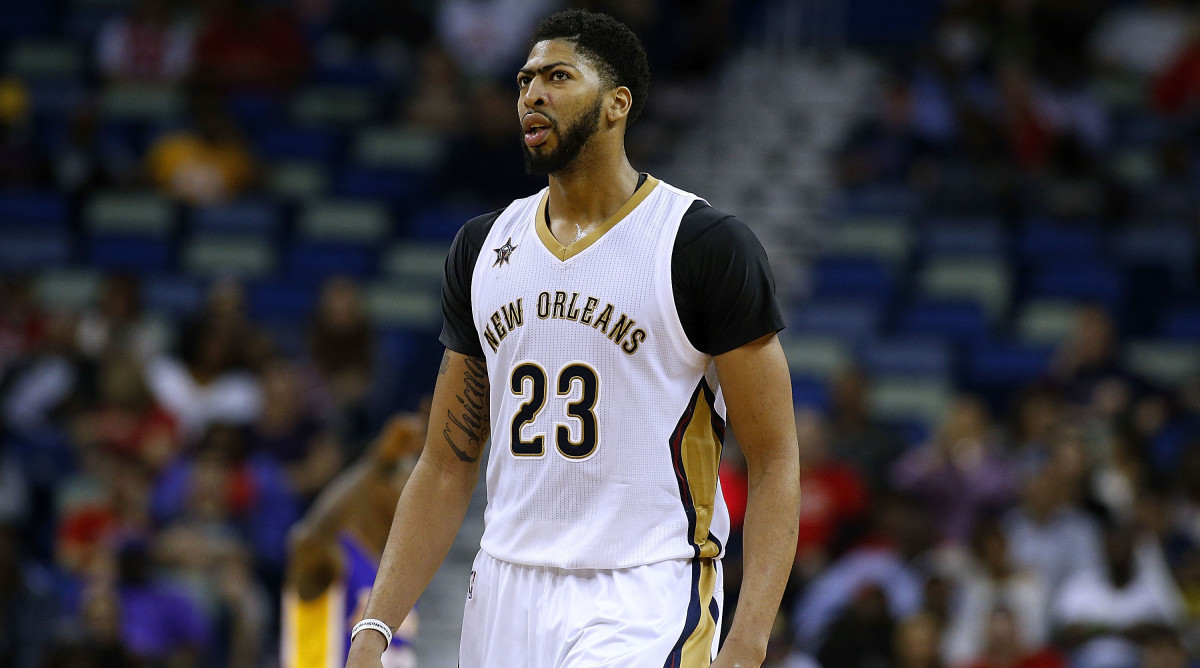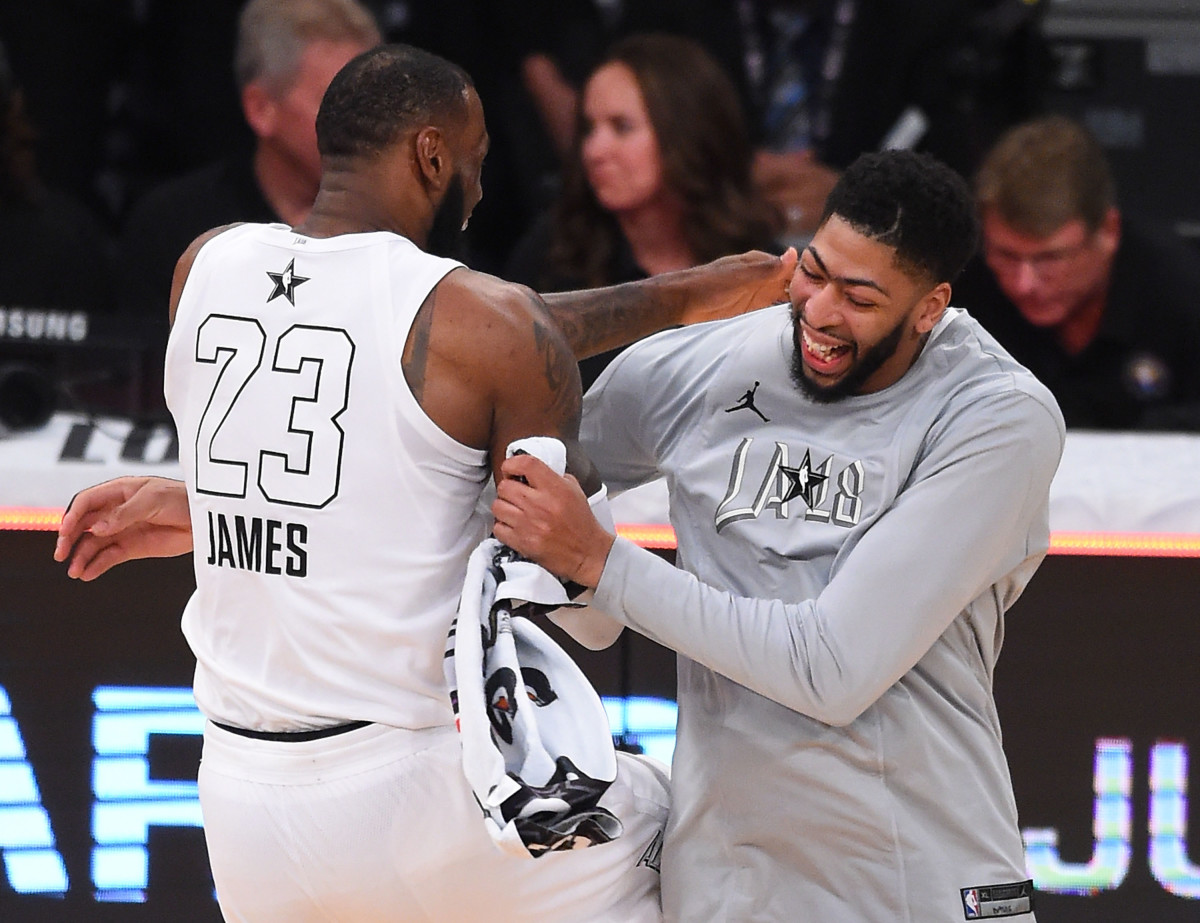The Trouble with Anthony Davis Lakers Rumors

Over the past 96 hours, the biggest story in basketball has gone from subtext to text. Various reporting from ESPN brought this discussion to the forefront at the beginning of the week, and then LeBron answered honestly. "That would be amazing," James told ESPN's Dave McMenamin on Tuesday. "Like, duh. That would be incredible." James was talking about an Anthony Davis Lakers trade, which means everyone else can now admit they have spent past several months wondering about the same thing.
Then Wednesday night, with the Pelicans battling injuries and struggling to keep themselves in the Western Conference playoff hunt, Davis did his best to re-center the focus on this season and slow the swirl of speculation this week. "It's cool to hear any high-caliber player say they want to play with me," Davis told ESPN's Zach Lowe, "but my job is to turn this team around. If we're 15–17, that means I'm not doing my job."
Davis's comments aside, the thrum of rumors and/or fan fiction will continue at least another 24 hours. The Pelicans are in Los Angeles to play the Lakers Friday night. And while the conversation continues for one more day, it's probably worth mentioning that while Anthony Davis would probably be the most dominant player to be traded since Kevin Garnett, Davis to the Lakers will be a very difficult needle to thread. It’s not to say that an L.A. move can’t happen, and it's not a criticism of anyone else who has connected the Klutch Sports dots in play here. I've been doing the same thing, talking about Rich Paul like he's some combination of Keyser Soze and Jerry West in 1996. But as this week's speculation has brought the Lakers possibility to the forefront, I've started to think more critically about what's actually possible in Los Angeles.
Open Floor Podcast: Examining Trade Possibilities for Anthony Davis
The first problem for the Lakers will be optics. Dating back to the vetoed Chris Paul trade in 2011, the Lakers have struggled to execute blockbuster deals, in part owing to league-wide resentment of everything they represent in the NBA ecosystem. Back then, it was rival owners like Dan Gilbert who were lobbying David Stern to veto a perfectly valid and mostly-fair trade, ostensibly because the Lakers raiding the small market Pelicans would've undermined everything the league had been trying to prevent with its freshly-signed CBA in December '11.
Whatever you think of that logic in hindsight—it's generally ridiculous—the resentment animating that controversy hasn't disappeared, and the concerns about public perception remain as well. Just two years ago, the Pacers were aggressively lobbying the league to punish the Lakers for tampering with Paul George (they eventually succeeded). Last summer, the Spurs were apparently reluctant to trade Kawhi Leonard to L.A. Just last weekend, David Aldridge of The Athletic reported that Suns owner Robert Sarver was "adamant" that his team would not send Trevor Ariza to the Lakers, in part because he didn’t want to look like the Lakers farm team.
Lakers fans might argue the Spurs were posturing for a better offer this summer. The Pacers, too, likely would have listened to a Paul George offer had the Lakers offered the No. 2 pick in the 2017 draft. The Suns change plans every other week—divining any sort of organizing principle for that franchise is a waste of time. Optics or not, Sarver's the same owner who traded Steve Nash to L.A. in 2012. If the Lakers had put a first round pick on the table in talks with Phoenix, Trevor Ariza could very well be in L.A. right now. So there are shades of gray in each of these cases.
Still, some level of Lakers resentment is real, and nobody is in a rush to be seen clearing a title path for Jeannie Buss and Rob Pelinka. That adds a degree of difficulty to the next steps here. For instance, LeBron James likes Damian Lillard? That's great. The Blazers are more likely to fold the franchise than trade Damian Lillard to the Lakers for Lonzo Ball and Brandon Ingram. And just the same, presented with any trade offers that are roughly equivalent, it's hard to imagine the Pelicans will be thrilled about rewarding the diligence of Rich Paul or Magic Johnson. For now, asked about the possibility of Lakers tampering with Davis, Pelicans GM Dell Demps said this week, "We're going to let the league handle it. We're just worried about our team."

Speaking of roughly equivalent offers: consider the Lakers trade assets. Brandon Ingram has struggled to find his footing next to LeBron, and while he might eventually look better on his own team, his trade value has taken a hit in the meantime. Kyle Kuzma is the inverse of that story; he has looked phenomenal next to LeBron over the past month, but there are reasonable questions about how much he could do on his own. Lonzo Ball, meanwhile, remains one of the most confounding players in the NBA. He excels at a number of skills that are hard to measure, but he can float for long stretches at a time, and his impact varies by the week.
Lonzo isn't a star who can anchor any team's rebuilding effort. Neither is Kuzma. Ingram might be, but that read on his game is becoming less convincing each week. Aggregating all three of those imperfect young players into one deal would at least give the Lakers a chance, but it's not a sure thing. There is no Victor Oladipo here and no DeMar DeRozan. There are no meaningful draft picks to offer. All of which is to say, if Davis is available to the highest bidder sometime within the next six or seven months, L.A.'s offer wouldn't be hard to beat.
The easy answer to that problem is to emphasize the leverage that comes with AD's impending free agency in 2020. Davis will be eligible for a $239 million contract extension this summer. If he turns that down and signals that he plans to leave in free agency, New Orleans will have to listen trade offers. At that point, if Rich Paul reaches out to prospective suitors and makes it clear that there will be no discussion of any non-Lakers deal in 2020, that complicates the calculus for everyone else.
Take the Celtics: Conventional wisdom has always held that Boston's Anthony Daivs offer would be anchored by Jaylen Brown, this June's Kings lottery pick, and two more first-round picks (from the Clippers and Grizzlies). But Brown has struggled this season (he's been even more uneven than Ingram) and the Kings have been good. Sacramento will probably land in the lottery, but instead of the top five pick Boston expected to be offering, it's looking like that Kings pick will be closer to the eight to 14 range. If the value of his two most attractive trade assets is cut in half, Danny Ainge could be forced to offer Jayson Tatum instead of Brown. Tatum would probably be the most attractive asset the Pelicans would be offered, and the type of player who could anchor a new era in New Orleans.
Would Ainge do it? Tatum has been considered untouchable since late last season, Tatum and Kyrie Irving share the same agent (Jeff Wechsler), and absent a trade, Tatum is a prospective All-Star who's likely in Boston for another 10 seasons. It's one thing to "bet on your culture" if Davis is promised for one season and nothing more, but if a trade means the Celtics would have to part ways with Tatum, the bet becomes particularly aggressive in Boston. Likewise, if the Celtics won't offer Tatum while other would-be suitors are scared off by L.A. free agency the following summer, the Lakers package could become more competitive. All of this could get real.
A few weeks ago in L.A., LeBron was thinking back on his decision to join Dwyane Wade and the Heat. “To accomplish what I really wanted to accomplish in this league—and that’s winning at the highest level—I needed him,” James said of Wade. “That’s why I made the jump.” If James is willing to sell himself as the Wade to Davis's LeBron now, maybe Davis will see the light and do everything he can to get to the Lakers.
The problem is that even if Davis is on board, there will be more hurdles. It's popular to conclude that we have entered a new era in the NBA lately and this is the new paradigm for player movement; once players are facing down free agency, they take ownership of their careers and leverage their way onto new teams. Bill Simmons and The Ringer have called this phenomenon "pre-agency"; the Wall Street Journal has likened the new NBA marketplace to the soccer transfer market, wherein "contracts are mere suggestions".
Pre-agency is a real thing, but it's important to be careful about overstating the actual agency that comes with it. As the tides have shifted in the NBA, it may feel like we're in the middle of a new era in player empowerment, but what's actually happening is a little bit more complex and harder to describe. Kawhi Leonard wanted to be in L.A.; he wound up in Canada. Paul George wanted to go to L.A. too. He was last seen extolling the virtues of a quiet life in Oklahoma. Before he landed in Boston, Kyrie Irving reportedly listed the Knicks, Spurs, Heat, and Wolves as his preferred destinations. Jimmy Butler was reportedly seeking a deal to the Knicks, Nets, or Clippers. The Sixers weren't mentioned until the Butler deal was done.

Davis is younger and more dominant than every single player mentioned above. If he's available, even as a one-year gamble, teams will be even more aggressive than they have been for stars of the past. If the Blazers sputter out in the first round, for instance, wouldn't it make sense to call the Pelicans and offer C.J. McCollum, Zack Collins, and anyone else who's not Damian Lillard? If the Knicks believe they are getting Kevin Durant, wouldn't they offer almost any combination of picks and players to go get Davis in the same summer? Shouldn't they offer Porzingis? The Bulls could offer their own picks and young guys; the Nets could offer everyone on their team; the Clippers could make a play for Davis instead of waiting on KD; the Wizards could offer John Wall and Bradley Beal and literally anyone else New Orleans would want; the Sixers could offer Joel Embiid and try to sell Rich Paul on consolidating Klutch power with a Simmons/Davis superteam on the East coast. And even if half of those offers never materialize, there will more wild cards in the mix. The Pelicans will have options. Davis will only have so much influence, and these things always end in ways we can't predict. That’s the real lesson of the new era in player movement.
The prospect of Lakers free agency in 2020 comes with its own uncertainties. While it looks like a compelling threat now, preserving max cap space for Davis would likely require the Lakers to spend a second straight season surrounding LeBron James with role players who aren't good enough to contend for a title. It would amount to Lakers management doubling down on this summer's "patience" strategy as the best player of his generation turns 35 years old. And of course, there's also the possibility that the choice would be made for them. If Kevin Durant and Kawhi Leonard sign elsewhere while Klay Thompson stays with the Warriors, the Lakers won't necessarily have many alternatives beyond waiting on Davis. That scenario would make a Lakers AD free agency play more plausible, but it also underscores the final question underlying the pursuit here.
James may be the best player of his generation, but that generation is aging out of the league. He and Wade just played an honest-to-God farewell game. Nobody wants Carmelo. Chris Paul is slowing down in Houston. Meanwhile, a player like Kyrie Irving is smack in the middle of his prime and playing the best basketball of his life. He'll spend considerable time and energy talking through the future with Davis, and some of those discussions have already happened. Kyrie is 26 years old, Davis is 25; they are good friends. James is almost a decade older than both of them.
An age difference doesn't foreclose the possibility of an alliance, but it highlights how much has changed since the last time LeBron successfully convinced a free agent to join him. LeBron, Wade, and Bosh bonded at USA Basketball events. LeBron hasn't been a part of USA Basketball since 2012. It's Kyrie who's been leading national teams at the World Championships and the Rio Olympics, connecting with all of today's superstars.
WILDER: Kevin Durant and the Endless Search for Enimies
When those players ask about life with LeBron, what do you think Kyrie says? Kevin Durant may have given us a hint earlier this month. "So much hype around LeBron comes from other people," Durant told Ric Bucher and Bleacher Report. "He has so many fanboys in the media. Even the beat writers just fawn over him. I’m like, we’re playing basketball here, and it’s not even about basketball at certain points. So I get why anyone wouldn’t want to be in that environment because it’s toxic. Especially when the attention is B.S. attention, fluff. It’s not LeBron’s fault at all—it’s just the fact you have so many groupies in the media that love to hang on every word. Just get out of the way and let us play basketball.”
Various pundits dismissed those Durant comments as jealous or self-serving, but I don't know. Perceptive and a little bit too honest seem like the better way to describe them. LeBron does get all the attention on any team he plays for, and there are additional layers of melodrama that follow him wherever he goes. When the teams win, the story is about LeBron. When his teams lose, the story is about everyone else. These are self-evident truths to anyone who has paid attention to sports for the past 36 months.
LeBron's role in cultivating that atmosphere could be its own discussion. He's the most popular superstar the NBA has seen since Jordan, so some of this is beyond his control. But even the most charitable reading of the past few years leaves no room for debate about the bargain facing LeBron teammates. Any superstar playing with the Lakers has to understand that LeBron will garner more attention. He'll likely wield significantly more influence in the media, and especially within the organization itself. The LeBron bargain has been worthwhile for stars in the past; the question is whether it will make sense for Davis. Whether through a trade this winter or this summer, or convincing L.A. to wait for free agency in 2020, the only way this move happens is if Davis makes it clear that the Lakers are his one and only choice.
The Lakers could absolutely win this battle. If James's partnership with Rich Paul and their evolving influence on the sport ultimately sways this race in L.A.’s favor, it will be incredible, and it would be a fitting coda to a career that's been equally revolutionary on and off and the court. Until that happens, though, the logistics of the next steps are daunting. Not many distressed teams are in a rush to trade their stars to Magic and Pelinka. Lonzo and Ingram have underwhelming open market value, while Kuzma has more value to L.A. than he would anywhere else. The Pelicans will probably have more attractive options than the Lakers in July, and so will most of this summer's marquee free agents. Absent a superstar running mate in New Orleans, it's not clear that James would find one elsewhere.
The news this week, then, shouldn't be focused on what’s possible for Anthony Davis in Los Angeles. The story here is how badly LeBron needs him.
